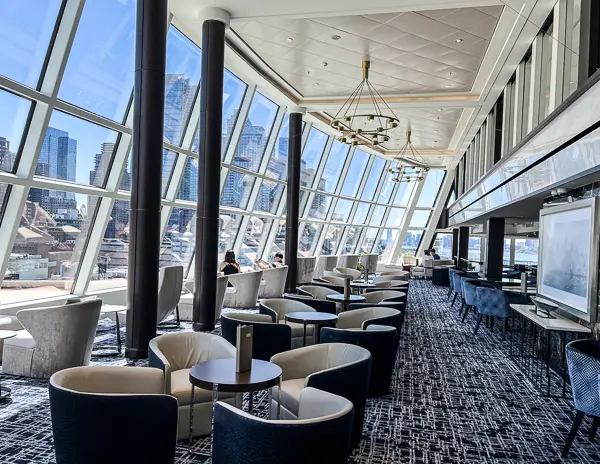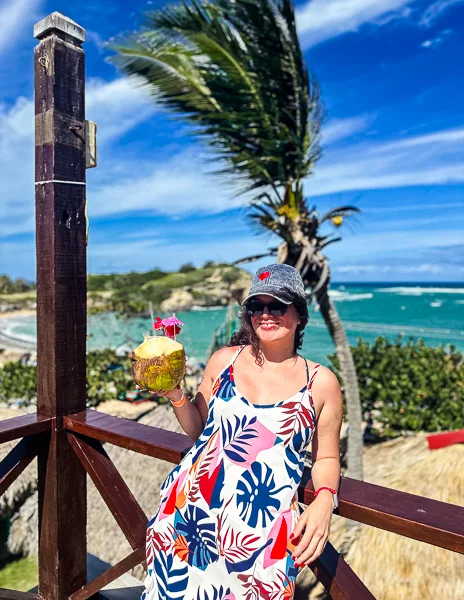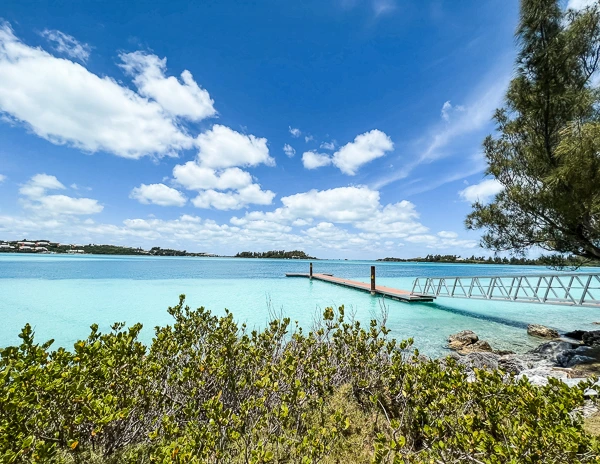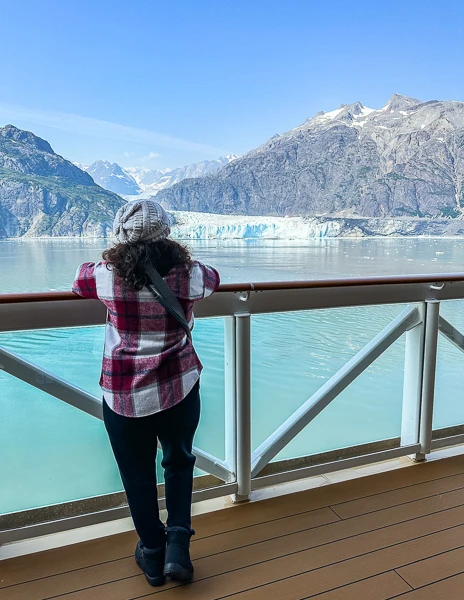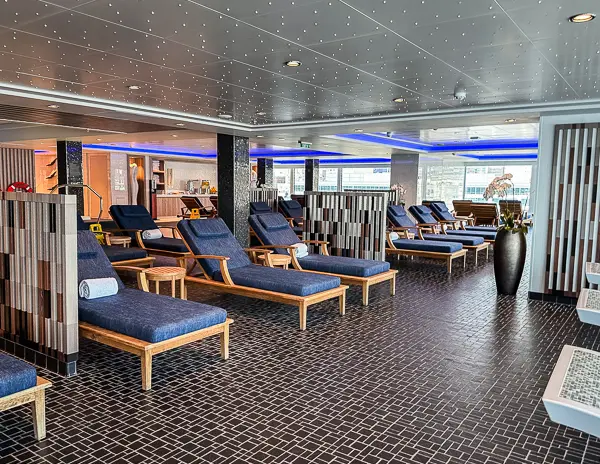20 Must-Know Tips for First-Time Cruisers: Avoid Common Mistakes!
Planning your first cruise can be as exciting as it is overwhelming. We’ve compiled 20 tips for first-time cruisers to help you avoid the common mistakes we made on our first cruise.
Our first cruise was to the Southern Caribbean with Royal Caribbean—a memorable vacation despite a few hiccups. We hadn’t researched the ports or planned shore excursions, so we missed truly enjoying what the islands offered. We also forgot to pack essential items, like a swimsuit for my husband, which had us scrambling at the first few stops. And we knew nothing about drink packages and what was included and not included in drinks.
We recently went on a cruise with a first-time cruiser, and although we tried to prepare her as best as possible, she still made a few of these common cruise mistakes.
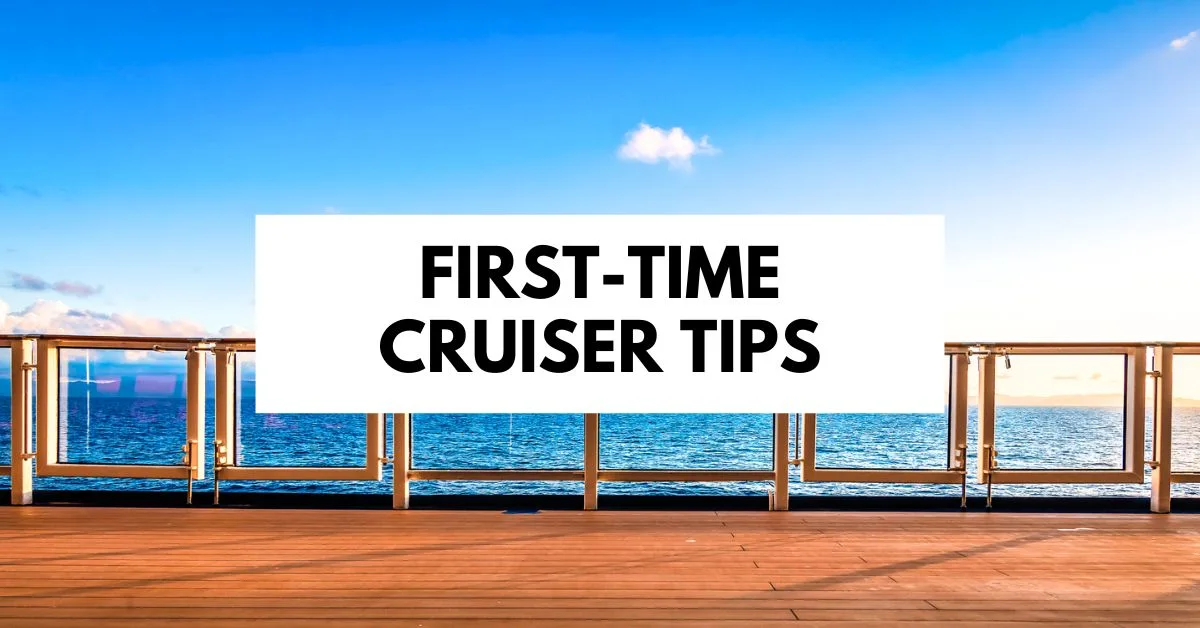
Disclaimer: This post may contain affiliate links, meaning we earn a commission at no extra cost. Please refer to our full disclosure for details.
In this guide, I’m sharing tips to help first-time cruisers make the most of their trip and avoid common mistakes.
1. Don’t Blindly Book Any Cruise Line and Cruise Ship
Selecting the right cruise line and ship can greatly influence your overall cruise experience. A poor choice might dissuade you from cruising ever again. For instance, our first experience with Carnival was drastically different from our trip with Royal Caribbean—it was so disappointing that we didn’t cruise again for eight years. However, our return to cruising with Norwegian Cruise Line rekindled our love for cruising, and we’ve been avid cruisers ever since.
Remember, finding a cruise line that suits you doesn’t mean you’re tied to them forever, but it can significantly impact whether you enjoy cruise vacations. Different ships cater to different needs—some are perfect for couples, others for families or solo travelers.
To make an informed decision, thoroughly research the cruise line and its ship classes. Read reviews, browse photos, and watch videos to get a realistic impression of what to expect. It’s similar to choosing an all-inclusive resort for a vacation—taking the time to pick the right one will lead to a memorable experience.
2. Don’t Overlook the Ports
A common oversight among first-time cruisers is not thoroughly evaluating the ports on their itinerary. While selecting the right cruise line and ship is crucial, the destinations you visit are equally important. Review the itinerary carefully, especially the time allocated at each port. If you’re planning shore excursions or intend to explore independently, ensure there’s sufficient time—three hours at a port, for instance, might feel rushed.
Also, consider the number of sea days included. While some cruisers enjoy these days’ relaxation, others might find them monotonous. Your preference for sea days will become clear only after experiencing them.
Ports are a highlight of cruising, and overlooking this aspect can lead to a disappointing experience. Make sure the itinerary aligns with your interests and expectations.
3. Read the Fine Print Carefully
It’s easy to overlook the fine print when booking a cruise, but it contains important information. Key details include the cancellation policy—understanding your options if you need to cancel can save you stress and money. While most cruise lines enforce strict cancellation terms, some offer more flexibility.
Also, be aware that itineraries are subject to change. Factors like weather can prompt the cruise line to alter or cancel stops, with possible substitutions or compensations like partial refunds or credits towards future cruises.
Remember to check the deadline for final payments, which are typically required 4-6 months before departure. Knowing these details can help ensure a smoother cruise experience.
4. Always Buy Travel Insurance
One vital piece of advice for first-time cruisers is not to skip travel insurance. Many new cruisers overlook this or fail to recognize its importance. Travel insurance protects against unforeseen circumstances disrupting your plans, such as severe weather, medical emergencies, or unexpected family bereavement.
If such situations force you to cancel your cruise or need medical attention, a good travel insurance policy will cover you, offering significant peace of mind. Make sure you understand what the insurance covers to make an informed decision about your policy.
Cruise Tip: You don’t have to buy travel insurance with the cruise line. You can buy it through a third party and add “cancel for any reason” for an additional cost.
5. Book Your Cruise Early
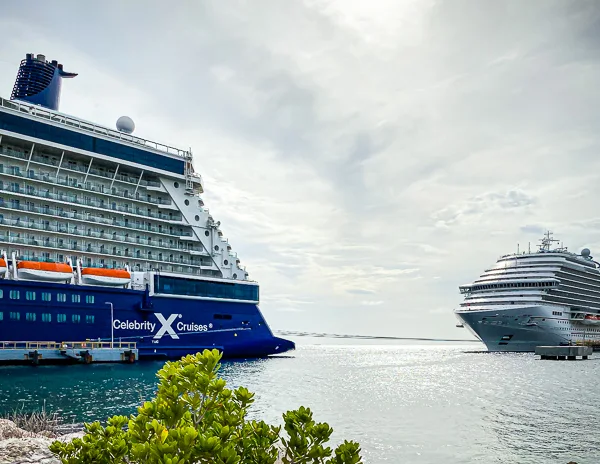
When planning your cruise, it’s wise not to delay. Booking early typically gives you several advantages. Not only do you have a better selection of cabin types, but you might also secure a lower price. For example, we booked a cruise more than a year in advance, and four months later, the cost of the same cruise had doubled.
Prices can fluctuate based on the destination, season, demand, and specific ship. Early booking can help you lock in the best rates and get the preferred accommodations.
Cruise Tip: Another reason to book in advance is that you can slowly pay it off. This is nice, especially if you book a year or more in advance. So unless you book past the final payment due date, you don’t have to pay for the cruise in one lump sum, just a deposit.
6. Don’t Book the Wrong Cabin-Type
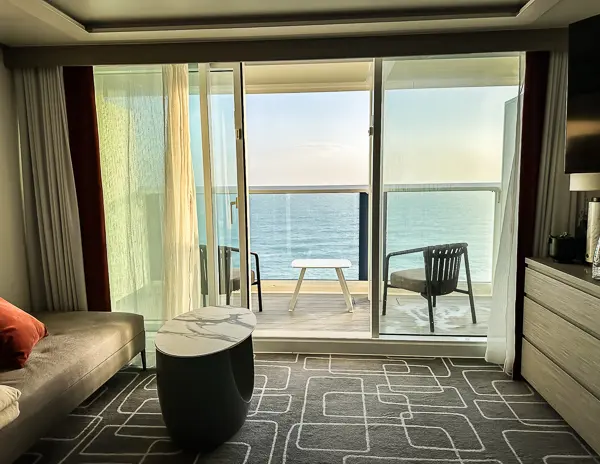
Selecting the right cabin type is crucial for your comfort during the cruise. For some, the least expensive option—an inside cabin on a lower deck—is adequate, especially if they plan to spend minimal time there. However, if you’re claustrophobic or dislike confined spaces, avoid inside cabins, as they lack windows and can feel restrictive.
If you enjoy spending time in your cabin, consider opting for at least an ocean-view room. A balcony cabin, though more expensive, offers the best experience with private outdoor space, making it difficult to go back to less expansive options once you’ve enjoyed it.
Cruise Tip: If you suffer from motion sickness, book a mid-ship cabin on a higher deck to feel less movement and enjoy a quieter environment. Also, check what decks are above and below you to avoid being under noisy areas like dining rooms or pool decks.
7. Consider the Optional Extras
When booking a cruise, remember that there are always optional extras available. These include gratuities, shore excursions, drink packages, paid cruise activities, and specialty dining. While booking these extras in advance is unnecessary, some may sell out, especially popular shore excursions, which tend to fill up quickly. You can typically purchase drink packages on embarkation day without an issue.
Keep in mind that spending on these extras is completely optional. Depending on your preferences and how you choose to travel, you can enjoy a wonderful cruise experience without additional experience.
8. Avoid Flying on the Day of Your Cruise

It’s risky to fly on the day your cruise departs, as flight delays or cancellations could cause you to miss your ship. We recommend arriving at least one day early to provide a buffer against travel disruptions. This strategy does mean booking a hotel for the night before your cruise, which adds an extra cost. To reduce this expense, we often use travel credit card points to cover hotel charges.
9. Pack Wisely: Avoid Underpacking or Overpacking
Many first-time cruisers overpack. We learned this the hard way when we brought our largest suitcase on our first cruise and wore only half of what we packed. Conversely, underpacking can be just as problematic. For instance, our family members regretted not packing enough essentials, like extra underwear for their child (she packed 2 by mistake), on our last cruise together.
Remember, you’re likely on the cruise for just a week or two. Keep it simple with basic, versatile wardrobe items that you can mix and match. There’s no need to bring every pair of shoes you own. Keeping it simple helps you make the most of your space and enjoy your trip without excess baggage
Read more:
Cruise Clothes for Women Packing Guide
Cruise Clothes for Men Packing Guide
10. Don’t Forget to Bring the Essentials
While packing for your cruise, some items are necessary to make your trip smooth and enjoyable. Here’s what I always make sure to pack:
- Sunscreen: You’re going to need it, especially if you plan on soaking up the sun on deck or at port.
- Aloe: In case sunscreen isn’t enough and you catch a bit of a burn.
- Motion Sickness Medication: Even if you’re not usually seasick, better safe than sorry!
- Hat or Visor: The best way to keep the sun off your face and enjoy those sunny days comfortably.
- Sunglasses: For those bright afternoons lounging by the pool or exploring ashore.
- Appropriate Shoes: Whether flip-flops for the beach or dress shoes for the captain’s dinner, ensure you’ve got the right footwear.
- Your Swimsuit: Because what’s a cruise without some water fun?
Read more: Pack these Cruise Essentials
11. Print Out Your Cruise Documents
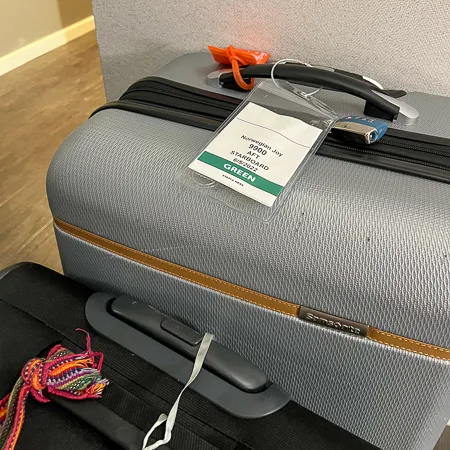
Always print your cruise documents before you leave home. A lot of folks think keeping them on their phone will do, but you can’t always rely on having a good Wi-Fi or data connection when you need it most. Plus, the check-in process at the port is often quicker with paper copies because the staff can easily stamp or scan them.
Remember to print and attach your cruise luggage tags, too!
12. Arrive at the Cruise Port Early
By not arriving at the cruise port, you’re robbing yourself of valuable time onboard the ship.
Don’t miss out on precious cruise time by arriving late at the port. Embarkation day counts as day one of your itinerary—it’s part of what you paid for! Opt for an early check-in time to get on board as soon as you can and start your cruise vacation off right. The sooner you board, the sooner you can begin exploring the ship and enjoying all the amenities.
13. Don’t Miss the Safety Drill
Don’t skip the muster drill—it’s super important and mandatory for everyone. Luckily, it’s gotten way easier recently. Now, you watch a safety video before you even board, and once you’re on the ship, you quickly check in at your designated muster station. It’s quick, painless, and gets you ready for any emergencies without ruining the vacation vibe.
14. Make Reservations for Specialty Dining and Shows
If you’re eyeing that fancy dinner spot or a must-see show on board, book your reservations early. You can usually start booking 90 days before your cruise. However, you can sometimes make reservations once you board, though it’s riskier. For instance, on the Norwegian Epic, we didn’t book any specialty dining in advance, and sadly, we couldn’t get into any restaurants all week—a mistake we won’t make again!
Not all shows require reservations, but booking them on your first day on the ship is best, as availability can vary widely depending on the cruise line and ship.
15. Don’t Forget to Bring Cash
Even though transactions on the cruise ship are mostly cashless, having some cash on hand is a good idea. The staff often appreciates cash tips and are great to have on hand for the casino if you’re feeling lucky. Plus, you might need cash to shop in gift stores or on excursions in port.
16. Don’t Do Anything Reckless
You’re on vacation to have fun, but it’s important to remember that certain actions can lead to being removed from the ship—and that’s not fun at all. Here are some critical no-nos:
- Don’t bring drugs on board. Just avoid it entirely.
- Don’t overindulge in alcohol. Sure, you’re here to relax and enjoy, but avoid being the person who ends up sick or unconscious in public.
- Don’t bring weapons on board. It’s unsafe and against cruise policies.
- Don’t climb or stand on the railings. It’s extremely dangerous and could lead to serious accidents.
- Avoid attempting to climb the ship. This is unsafe and not worth the risk.
Read more: Prohibited Items on a Cruise
17. Don’t Miss the All Aboard Time at Ports
One of the biggest mistakes first-time cruisers make is missing the all-aboard time, which can result in being left behind as the ship departs. Remember, the cruise ship will not wait for latecomers. If you miss the ship, you’ll have to arrange and pay for travel to the next port alone, without any refund for the missed cruise time.
All aboard times are clearly communicated: they’re announced in the morning as passengers leave the ship, listed in the daily cruise planner, and posted on a sign at the gangway. This crucial deadline is typically 30 minutes before the ship’s scheduled departure.
We recommend returning to the port at least an hour before the scheduled departure time to avoid any stress. It’s better to be safe and have a little extra time to board than to risk missing the ship.
“Pier runners” are cruisers who arrive late and rush to board the ship just before it departs, often running down the pier to catch it in time.
18. Don’t Forget to Check the Weather
Always check the weather before your cruise, especially during hurricane season. Weather conditions like hurricanes can lead to delays, rerouting, or even trip cancellations. Being informed helps you prepare accordingly and underscores the importance of having travel insurance.
19. Don’t Be Shy in the Dining Room
First-time cruisers often don’t realize they can order as much as they want in the main dining room. Feel free to order that second appetizer or share an extra entrée—it’s all included! If it’s lobster night, why not make it a surf and turf dinner by adding prime rib?
While you shouldn’t waste food, the portions are usually small or moderate, so ordering extra and sharing with others at the table is easy.
20. Check Your Bill Daily
One of the most important tips for all cruisers, including first-timers, is to review your daily statement. You can usually check your bill from your cabin TV or cruise app, where all charges to your account are listed. If you spot any errors or unfamiliar charges, visit guest services immediately. Even if you haven’t made any purchases, checking regularly can help you avoid surprises on disembarkation day.
This is a mistake family we were cruising with made, and they found themselves lining up at guest services on the morning of disembarkation day.
FAQs
How do I plan a first-time cruise?
When planning your first cruise, start by choosing a cruise line that matches your interests and needs. Consider what type of traveler you are: are you looking for a family-friendly cruise or an adults-only experience? For detailed guidance, follow our 9 Key Steps to Planning a Cruise to help you plan your first cruise.
What should a first-time cruiser know?
The key thing to know is that a cruise is what you make of it. If you want to relax and lounge by the pool all week, you can do that. If you prefer to stay active and try new things, you can do that too. Cruises are popular because they offer something for everyone, making them an ideal vacation option for all travelers.
How long should your first cruise be?
Your first cruise should be as long as you feel comfortable. If unsure, start with a shorter cruise to get a feel for it. We recommend a minimum of three to four nights and a maximum of seven nights for your first cruise.
BEFORE YOU SET SAIL, HERE ARE SOME RELATED ARTICLES YOU DON’T WANT TO MISS:
- The Best and the Not-So-Best Parts of Cruising
- Money-Saving Cruise Tips You Need to Know
- Do You Need to Purchase a Drink Package? Calculate the cost!
- 100+ Tips to Help You Plan Your Cruise
Kathy Ava
Meet Kathy Ava, a food, travel, and cruise writer based in Los Angeles/Pasadena, and the owner and main writer of Tasty Itinerary. With over 20 years of experience planning trips and logistics at her full-time job and for herself, she's become a pro at crafting unforgettable tasty itineraries. She's always on the hunt for delicious, fun travel destinations and cruise itineraries. She firmly believes that life is short and we must make the most of it, so always say yes to dessert.





